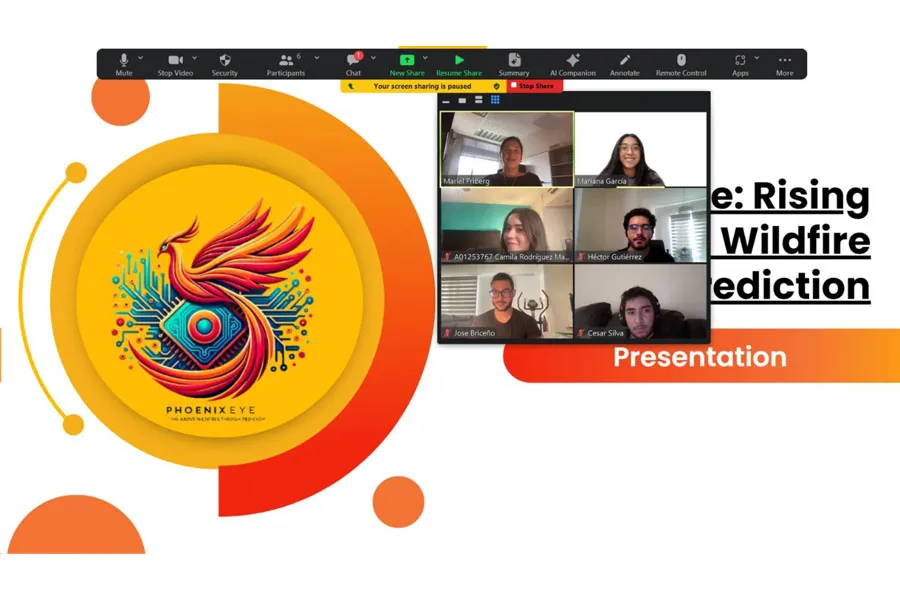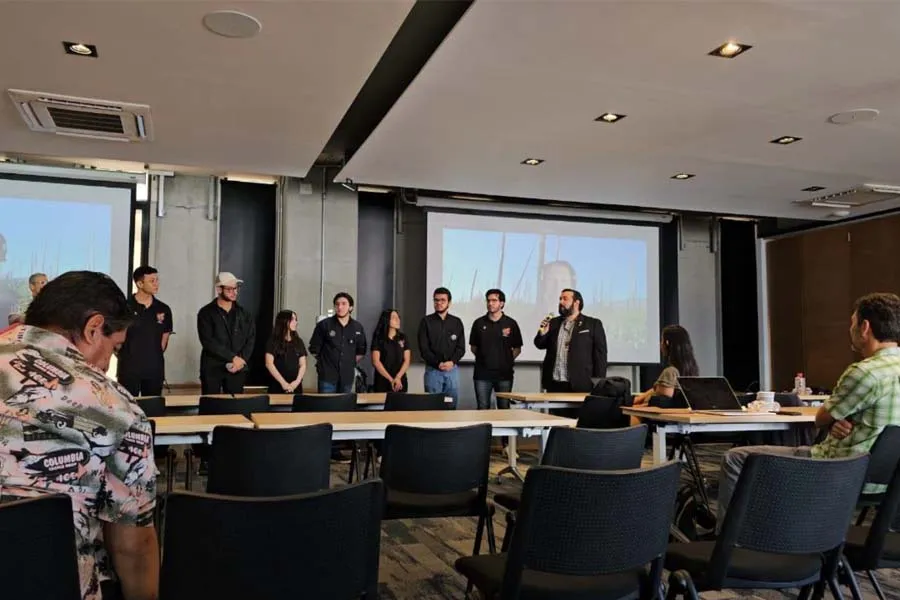Students from Tec de Monterrey’s Sonora Norte campus have been selected as world finalists in NASA’s International Space Apps Challenge Hackathon with their Phoenix Eye project.
This project predicts the trajectory of forest fires using a machine learning system to provide solutions in regions with limited access to the Internet and electricity.
The team consists of computer technology engineering students Camila Rodríguez, César Silva, Héctor Gutiérrez, and Mariana García; and economics student José Briceño.
“Being recognized on a global stage, especially in an event organized by NASA, encourages us to continue forward, improve, and expand our horizons,” said Mariana García, a member of the finalist team.
Phoenix Eye won second place in the Sonora State hackathon, which gave them a pass to participate in the semi-final where they were selected as global finalists.
The winners will be announced in January 2024.
“We’re excited about the potential our project has to make a real difference in forest fire management.” - Héctor Gutiérrez
Representing México on the global stage
Out of 25 challenges NASA declared internationally for this hackathon, each team selected one to work on for two days to develop a solution that was evaluated by staff at NASA and other space agencies to choose the winners.
Phoenix Eye, one of the two projects that will represent Mexico on the global stage, placed as one of the 40 finalists out of 587 nominees worldwide.
“This experience has given us a platform to share our vision and work with a wider audience, which could open doors to future collaborations and opportunities,” said Héctor Gutiérrez of Phoenix Eye.
To help prepare for the world finals, the team received advice and mentoring from Mariel Friberg, a NASA space-based fire monitoring expert.

Predicting forest fires to help communities
Phoenix Eye was created to address the issue of predicting forest fires.
“We were inspired by the local reality in Sonora where we realized that forest fires are a serious and recurring problem,” said José Briseño, a member of the finalist team.
“Juan Cirett, an ecologist from Sonora and independent consultant in natural resource management, told us about the lack of a system in Mexico for predicting the trajectory of forest fires,” said José.
The team added that this realization made them recognize a significant opportunity to contribute to this field.
Phoenix Eye is an intelligent system that predicts how a fire will spread within the first 24 hours after it starts to provide timely alerts to people or communities near the fire area.
Looking to help communities that lack access to an electrical network or the Internet, the students developed a device that can send an alert about the extent of a fire without needing to rely on a network.
“It not only improves emergency preparedness and response in these communities but also represents a breakthrough in bringing high-tech solutions to places that need them the most,” said César Silva, a member of the finalist team.
Participants in international colloquium
Following the Hackathon, the students presented their Phoenix Eye project at the International Colloquium on Space and Sustainability held in Jalisco on November 15 and 16 as part of the Science, Citizenship, and Space panel.
This event brings together the academic community, NGOs, private companies, and government agencies in Mexico to strengthen knowledge in Mexico on how NASA missions and programs can contribute to sustainability.
“It was an opportunity that empowered them and gave them a network of professional contacts that will help them connect and take their project to the next stage,” said Juan Gámez, leader of Entrepreneurship at the Tec’s Sonora Norte campus.
Gámez, who was part of the colloquium’s organizing team, pointed out that the members of the Phoenix Eye team were the only students who participated as speakers in the event’s panels.

Five years as Hackathon host
Since 2019, the Sonora Norte campus has been co-organizer and host of the NASA International Space Apps Challenge Hackathon in collaboration with Space and Sustainability and Space Apps Hermosillo.
Anayansi García, leader of Sonora Norte’s Professional Development and Liaison Center, said that thanks to this alliance, the campus is the only Latin American site with NASA representatives who personally advise young people in developing solutions to their challenges.
In this 2023 edition, Laura Vega, astrophysicist and researcher at NASA’s Goddard Space Flight Center, was part of the jury that supervised and supported the teams during the development of solutions.
On this occasion, more than 120 young people, organized into 20 projects, participated from various universities in the state.
“Working with students from other fields and universities gives them the opportunity to learn about other points of view and ways of working and strengthens their soft skills,” explained Lídice Siqueiros, coordinator of Professional Experience at Sonora Norte.
The Tec and NASA open the door to real projects
Gámez said that although many hackathons remain in the conceptual stage, the NASA Hackathon presents a new paradigm in which projects are followed up on.
“It’s important to have these spaces, not only for Tec students but also for young people in general because it gives them the opportunity to propose something, follow up on it, and take action to bring it to life,” Gámez said.
“The best thing is coinciding with people who also want to make things happen. There’s a big difference between proposing things we find interesting and actually executing a project,” said the academic.
Camila Rodríguez, from the Phoenix Eye team, said that the hackathon was an enriching experience that forced them to think critically and creatively, seeking innovative and real solutions to the problems presented.
The team reiterated that they are determined to continue developing the project so that it can be implemented, which is why they have invited Daniel Barreras and Julián Espinoza, fellow students from the Computer Technology Engineering program, to join their work team.
“We’re excited about our project’s potential to make a real difference in forest fire management and look forward to continuing to contribute to this important field,” concluded Héctor Gutiérrez, a member of the finalist team.
YOU’LL ALSO WANT TO READ...





